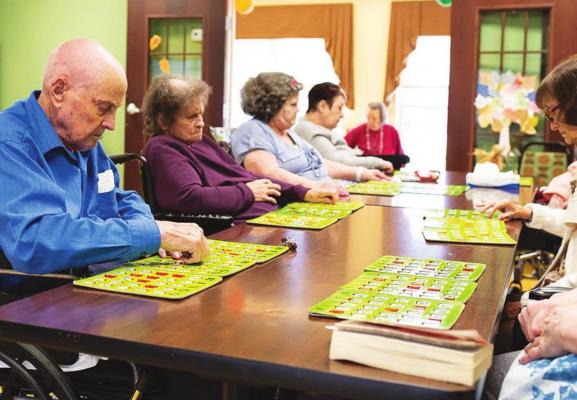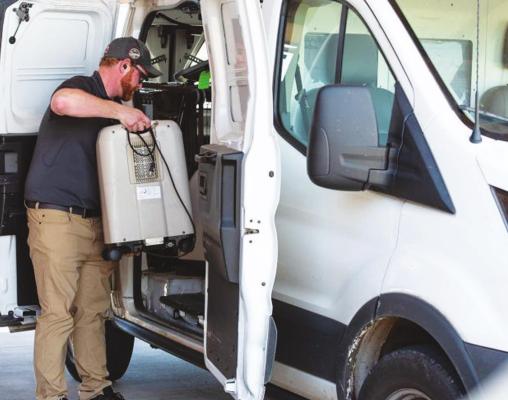Violations and deaths highlight COVID-19 dangers
Health inspectors cited Oklahoma City’s Windsor Hills Nursing Center last November after a certified nursing assistant was seen not washing her hands before, during or after treating five residents with incontinence one morning.
A few months earlier, at Pleasant Valley Health Care Center in Muskogee, an inspector wrote that several staff members and visitors entered the room of a resident who was supposed to be in isolation after contracting a drug-resistant bacterial infection. None was wearing protective gear.
And a year earlier, a certified nursing assistant at Hillcrest Manor Nursing Center in Blackwell pulled coins out of his pocket, used a vending machine and scratched his beard without washing his hands before he gave medicine to several residents, regulators reported.
As nursing homes across Oklahoma lock down to prevent COVID-19 from spreading to their elderly residents, an Oklahoma Watch analysis found that infection control or prevention violations are common at nursing homes in the state, as they are nationwide. Older people are at higher risk of catching the deadly disease.
The risk is being borne out in the growing number of coronavirus cases reported in Oklahoma.
As of today, March 26, seven Oklahomans have died and 248 have tested positive. Two of them were residents of Grace Skilled Nursing and Therapy in Norman, including a woman in her 60s who died earlier this week and another who died March 25, according to the facility. The facility announced
The facility announced March 26 that seven additional residents tested positive for the virus.
In addition, at least one other positive COVID-19 case has been confirmed in a nursing home: a 69-yearold man who was a resident at the Ponca City Nursing and Rehabilitation Center, according to news reports. He was diagnosed last week and has since been moved out of the facility and into a hospital.
None of the cases is known to have been tied to lapses in infection control or prevention at the facilities.
“Our goal remains the same – to prevent exposure or spread of the virus while continuing to care for the needs of all our residents,” said Theresa Green, a spokeswoman for the Norman nursing home. “Heighten precautions remain in place to help protect residents and team members as we continue to receive guidance from and to work closely with the CDC and state and local health officials on next steps.
Data from the Centers for Medicare and Medicaid show that more than half of Oklahoma’s 299 nursing homes were cited for infection-control and -prevention violations during the past two inspection cycles – from late 2017 to the end of 2019. There were 215 of the “health deficiency” citations at 167 facilities.
These types of violations, which generally don’t lead to fines and other sanctions, were the most common reported by state health inspectors.
Oklahoma isn’t alone in dealing with the issue. Across the country, 13,239 violations were reported in the same period; they occurred in 9,264, or about 60%, of all nursing homes.
As COVID-19 cases rise rapidly across the state and nation, advocates caution that these lapses could signal challenges ahead in dealing with the coronavirus.
“This could be a disaster that will spread like wildfire,” said Wes Bledsoe, who runs A Perfect Cause, an Oklahoma-based group that advocates for nursing home residents. “If we don’t get it under control, it likely will hit just about every nursing home or long-term facility in the state and nation.”
A Question of Risk
As of March 20, at least 55 coronavirus deaths – or more than a quarter of U.S. deaths attributed to the pandemic – had occurred among people in elder care facilities, according to a count by the Washington Post.
Thirty-five of them were linked to a single nursing home in Kirkland, Washington, where a severe outbreak began in mid-February. In Oklahoma, alarmed by the pandemic, many Oklahoma senior-care facilities have suspended nonmedically necessary visits, including family visits, canceled group events and even confined residents to their rooms.
Residents at a Norman senior -living facility gathered for bingo in November 2018. In recent weeks, many senior centers have discontinued events like these as they step up efforts to protect residents from catching the coronavirus. (Whitney Bryen/Oklahoma Watch)
Steve Buck, president of Oklahoma Care Providers, which represents the industry, said Oklahoma facilities have also ended communal dining and group activities, are screening staff for fevers and symptoms of COVID-19 before every shift and are checking all residents twice per day for symptoms.
“All Oklahoma nursing facilities are taking heightened precautions to protect their residents, in accordance with (federal and state guidelines),” Buck said.
Federal officials also announced this week that they would suspend nonemergency inspections, continue inspections from complaints and begin targeted infection-control inspections. Providers are also urged to conduct self-assessments, which officials stated might be the “best solution in some cases when there is a lack of personal protective equipment or state surveyors available.”
What the Data Shows
If past inspections are an indicator, nursing homes will find it tough to maintain and follow to a tee their strict infection-control and -prevention rules.
The 212 citations in that category since late 2017 show a mix of violations related to staff not properly washing hands or following guidelines for personal protection equipment for residents who need to be isolated. There were also lapses in recordkeeping and training.
The violations weren’t limited to underperforming facilities.
More than a third of the 167 nursing homes with a violation were rated at three stars or higher on the federal government’s one-to-five quality rating system.
Forty-one facilities were cited on multiple visits. Those included three nursing homes – Meadowlake Estates, Pleasant Valley Health Care Center and Inola Health & Rehabilitation – that had violations during three visits.
Oklahoma State Health Department staff conduct the inspections, and the data is sent to to federal officials. Each facility is inspected at least once a year; some get additional inspections because of complaints or poor performance in the past.
The visitor entrance at Grace Skilled Nursing and Therapy in Norman is closed after the facility suspended visitations due to the coronavirus outbreak. (Whitney Bryen/Oklahoma Watch)
As a result, Bledsoe said, the public gets only a limited glimpse at what’s happening in the facilities.
“That is all just basic infection control during (normal circumstances) and when they are being watched by (health inspectors),” he said. “If you can’t do it then, how are they going to deal with viral control with a pandemic like this?”
But Kimberly Green, chief operation officer of Diakonos Group, which operates nine skilled nursing and rehabilitation facilities in Oklahoma, said the citations in inspection reports are not a cause for alarm.
“Some of these are just routine,” she said. “It could be something really, really small or really big, but these surveys are supposed to be helpful and identify areas you are supposed to get stronger at or work on.”
Britton Nevitt, who owns and runs Pleasant Valley Health Care Center in Muskogee with her husband, said like many other facilities, it is retraining and reemphasizing proper infection control and prevention procedures on a daily basis. The center also hired a five-person consulting team to monitor staff practices.
“The team is out on the floor watching each hall and our staff to make sure proper infection control is being used at all time,” she said. “So it is all really beefed up.”
Because of the coronavirus, many nursing homes are prohibiting family members and friends from visiting residents. In Betty Carter’s case, that has meant a painful separation. She was used to visiting her husband, Bill, five days a week at the Fairmont Skilled Nursing and Therapy in Spencer until recently. She said the separation from Bill, who has dementia, is causing emotional distress for her and her family. (Photo provided.)
Short on Resources
Nursing homes report several obstacles that they say limit the effectiveness of their work.
Green said the industry faces many staffing and equipment shortfalls that are also straining hospitals.
Among the urgent needs, she said, are more personal protective equipment, or PPE, including face masks, gloves, hand sanitizer and gowns. She said nursing homes have received about a tenth of their request from the federal government’s Strategic National Stockpile, which collects medical equipment and medications that health facilities can request in an emergency severe enough to deplete local supplies.
“You know, here we are, being held to all these standards, but not getting the equipment to do it,” she said. “It’s like sending a soldier into war and asking them to build their own weapons and make their own uniforms.”
Geoff Walker, of Care-Source, loads oxygen machines into his van at Grace Skilled Nursing and Therapy in Norman on March 26. (Whitney Bryen/ Oklahoma Watch)
Mary Brinkley, who heads the elder-care nonprofit LeadingAge, said facilities could also face staffing shortages.
“This is a problem for us in a normal environment, much less one where people are afraid of the risks or they don’t have child care now that kids are home.”
Brinkley said she is in talks with state officials to see if there is anything they can do, such as providing financial help to workers, to ensure staff can keep working. But no specific plans have emerged.
Another concern, she said, is the availability of testing kits to make sure any COVID-19 cases are caught early, so staff members or residents can be treated and isolated. The more COVID-19 spreads outside senior facilities, the greater the chance it will enter their walls.
“We can’t just lock everybody down on our staff 24/7,” Green said. “It’s not the elderly people bringing it upon ourselves. It’s the healthy people who aren’t staying home and the ones who are still saying, ‘It’s OK to go out and get my nails done’ that are spreading this.”


